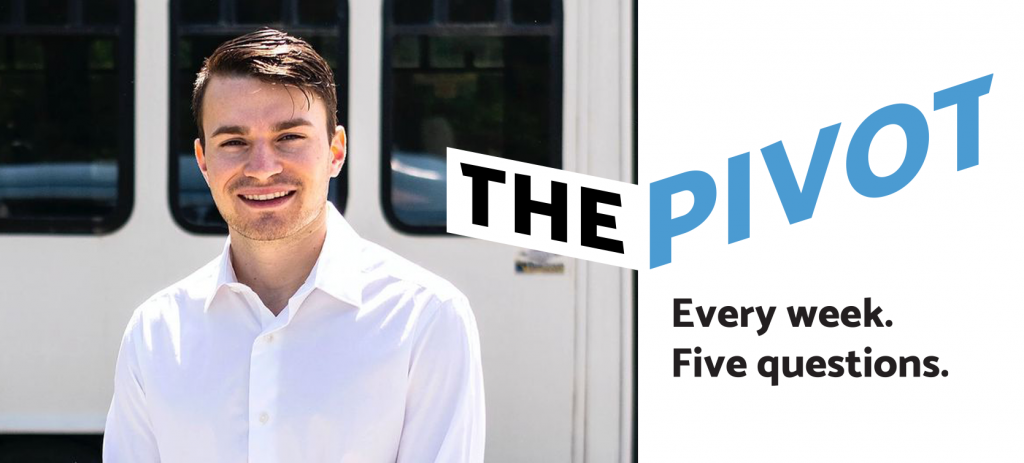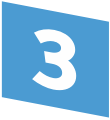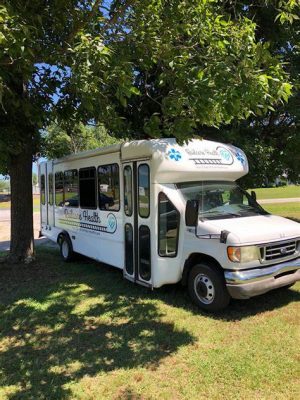
Kevin Travia
Kevin Travia connects communities with resources to improve health.

What’s your role in public health?
I graduated with a Bachelor of Science in Public Health in 2019, and I founded Railcare Health as a way for students to bring health care to community members in rural North Carolina.
I’m currently the Chairman of the Board for Railcare Health. The nonprofit serves dual purposes: offering experiences for students who want to work directly with rural communities and providing quality health care where it’s needed, for those who need it. The leadership is made up of college students from various institutions around the state, and many of the volunteers work in the communities where they live.
I try to help the team if they have questions and offer guidance based on my experience. I’m currently in medical school at the Brody School of Medicine at East Carolina University, which takes a lot of my time. I’m not able to get out in the field as often as I used to, but we’re expanding to the eastern part of our state and forming a team in the Greenville area.
I’m not sure what direction I will take after medical school, but it’s important to me to give back to the communities that raised me. I moved around a lot, so for me, community isn’t bounded by geography; it’s made up of people who need support — like I did growing up. I’d like to continue to volunteer with Railcare Health as a physician one day!

Can you describe your focus area in one sentence?
At the UNC Sheps Center, I learned about using research to improve access to primary care services. I am someone who uses data points to first understand where there are gaps in health care coverage and then try to bring resources to people who are underserved in the community — it’s an approach that improves health outcomes from the ground up.
My focus in public health is very strongly linked with quality improvement. As a LINC distinction track scholar, I’m working to find different areas of the health system where there may be gaps and people aren’t provided the care they deserve and need. Then, I collaborate with others to figure out solutions to fill those gaps, improve the system and, hopefully, provide a brighter health care landscape for the future.
[Editor: The Leaders in INnovative Care (LINC) Scholars Program prepares leaders to effect health system change.]

What brought you to public health?

The Railcare Health mobile clinic parks in a North Carolina community.
When I was younger, I did a lot of community service projects, like working with food banks. Through those experiences, I learned that helping others use available resources to improve their situation is something that’s very important to me. It makes me feel like I’m leaving this world a little brighter than when I got here.
When I was first picking my major, I really enjoyed chemistry and learning about molecules and things that a lot of people might not be interested in. I randomly stumbled upon the nutrition program at the Gillings School of Global Public Health because I was looking for ways to combine that knowledge with my love for service. Nutrition was the perfect blend of learning about ways I could help others on a local, systemic or global level and my excitement for molecular science. Learning about public health has been a kind of journey for me.

How have you pivoted in response to the coronavirus pandemic?
Railcare Health has scaled coronavirus testing to different members of the community, including migrant farmer living in work camps. We’re starting to partner with other organizations more and more, and UNC has helped a lot by providing protective equipment and guidance to help us operate while keeping our volunteers and clients safe. When we were first learning about the virus, I was very concerned about safety. I wondered, ‘Are we equipped to deal with this?’ It was incredible to me how many volunteers wanted to help. A lot of people were losing their jobs, and volunteers from near and far saw the impact of coronavirus on their community. Some of our volunteers drive for hours to visit rural counties around the state, trying to improve the health care system. Their passion is inspiring!

Who are you when you’re at home?
When I’m not studying, I enjoy getting outside and connecting with people. I’m always either going for a run or a walk and trying to enjoy any nice weather. I also like to play hockey — street hockey or ice hockey.
I have really supportive people around me that I like to talk or FaceTime with; I just try to keep in touch as much as possible during this strange time.
The pandemic has been awful in so many ways, but what keeps me inspired is seeing how different groups come together to uplift community members who need help. In a way, the world has become more connected since the start of this pandemic, because people with a passion for helping others have the best opportunity right now to come together for a better tomorrow — even if an event is held virtually. There is so much need, and I find solace in the drive people have for aiding our communities in need.
